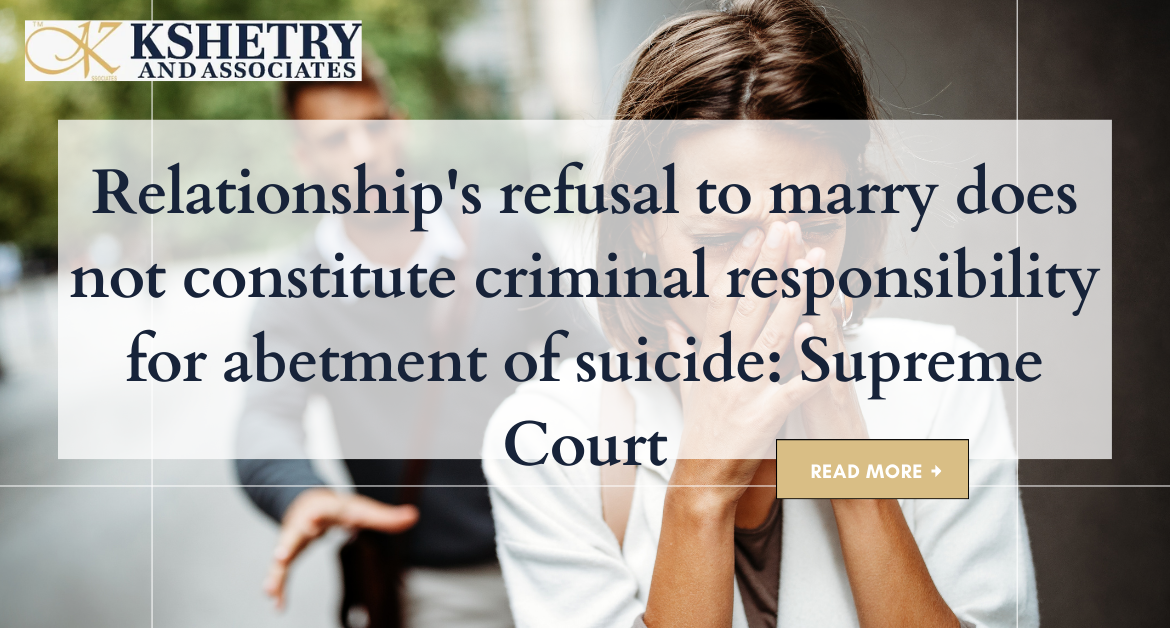The Supreme Court of India made it clear in a landmark decision that refusing to marry someone does not amount to abetment of suicide. The ruling was made in a case concerning the untimely death of a lady who committed suicide after her long-term partner refused to marry her. The court stressed that, despite being extremely upsetting, sadness is a natural part of life and does not always indicate criminal responsibility unless there is unmistakable proof of provocation or encouragement.
Key Elements of the Judgement
The Indian Penal Code’s (IPC) Section 306 definition of abetment was examined by the Supreme Court. The bench emphasized that abetment is a conscious mental process in which one person purposefully encourages or facilitates another’s suicide. It noted that specific proof of acts intended to result in such an outcome is necessary.
In this instance, the bench decided that the man’s unwillingness to get married—despite having been in a relationship for a long time—did not qualify as incitement under the law. The court clarified that even though emotional distress and disappointment are severe, they cannot be made into crimes unless they are combined with overt and intentional behaviours that promote self-harm.
Case Background
The case is about a woman who committed suicide after being rejected by her long-term partner. The prosecution argued that she mainly chose in response to the man’s refusal. However, as the investigation went on, it was found that the woman had brought poison, suggesting that her actions were intended rather than the sole consequence of the man’s behaviour.
Sections 417 (cheating), 376 (rape), and 306 (abetment of suicide) of the IPC were the first charges brought against the accused. Since there was no claim in the dying declaration that the accused ever engaged in sexual relations with the deceased under false pretences of a marriage vow or ever had a physical relationship with her, the Trial Court cleared him of all charges.
The case against the accused was further undermined by the lack of evidence demonstrating any act of encouragement or deliberate provocation on his part. Although the refusal to marry would have caused emotional distress, the court noted that this could not be classified as abetment to suicide under the law.
Reiterating Court Decisions
The Supreme Court cited earlier decisions that set a solid precedent for situations involving abetment to suicide in its decision. It reiterated that an accused person must have committed a blatant “positive act” that directly influenced the victim’s decision to end their life for them to be found guilty under Section 306. It is impossible to impose criminal culpability without such proof.
The Verdict’s Implications
This ruling has significant ramifications for how the law views relational emotional discomfort. The bench emphasized that, despite their devastating emotional impact, heartbreaks and broken relationships are common occurrences. Even while such incidents are unpleasant, they don’t usually result in legal responsibility unless there is concrete evidence of the behaviour that caused them.
The decision also highlights the importance of the courts’ differentiation between criminal intent and emotional weakness. It supports the notion that the law cannot punish people for acts that, although they may cause emotional pain, do not include wilful malice or the desire to cause harm.
A Balanced Legal Viewpoint
The Supreme Court’s historic ruling reminds us of the fine line that must be drawn between respecting the values of justice and understanding human emotions. In situations containing intricate emotional dynamics, it emphasizes the significance of evidence-based decisions to prevent people from being unjustly punished for events beyond their control.
Also Read: How to Choose the Best Law Firm in Kolkata for Your Legal Needs

